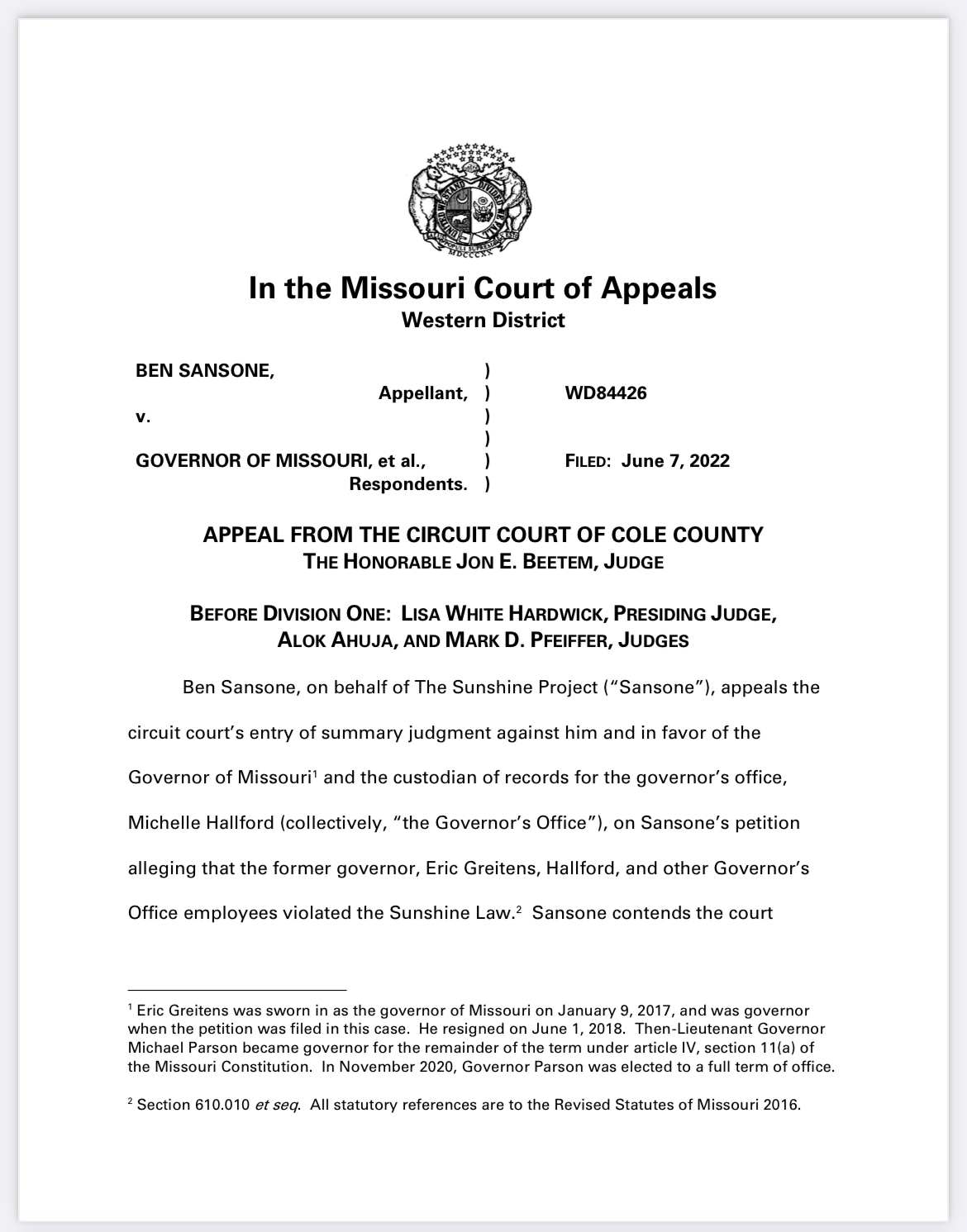
In what has been described as “a great day for corrupt Missouri officials,” a palpably reluctant panel of the Missouri Court of Appeals affirmed a lower court opinion determining that former Governor Eric Greitens and his staff did not violate Missouri’s open records law in denying a request for communications that were automatically destroyed by the self-deleting text messaging app, Confide, that Greitens installed — and encouraged his staff to install — on their cellphones.
https://www.courts.mo.gov/file.jsp?id=187177
Others described the opinion as “hugely problematic,” creating “perverse incentives for government officials to destroy documents as they go to prevent oversight.”
https://missouriindependent.com/2022/06/07/appeals-court-finds-greitens…
Emphasizing that “[n]othing in this opinion should be interpreted to suggest that we condone the use of ephemeral messaging applications by public officials,” and suggesting the need for legislative revision, the Missouri court ruled that because the records were destroyed, they were never retained by the governor’s office.
(Historical note: Greitens, The Missouri Independent reports, “resigned in June 2018 to settle a felony charge and avoid impeachment. He is now running for the U.S. Senate.”)
This is not the last the former Missouri governor will hear in the case. The appellant has issued a statement indicating that he will “seek to have the [Missouri] Supreme Court weigh in on these issues of great importance to the state.”
The Missouri Court of Appeals opinion turns on the fact that the state’s “Sunshine Law only requires that governmental agencies provide access to records then in existence, and in the agencies’ possession or under their control.”
This is unfortunate for Missouri where the definition of “public records” requires possession or control of existing records. The disputed records were no longer in existence, and the records were therefore not in the agency’s possession or control.
It has no bearing on the case currently pending in Kentucky’s courts.
In Kentucky Open Government Coalition v Department of Fish and Wildlife Resources Commission, the circuit court in January had no trouble in determining that under the expansive definition of “public records” found at KRS 61.870(2), communications about public business transmitted by public officials on private devices were public records governed by the open records law.
(The Commission did not assert that self-destructing text messaging apps were installed on the commissioners’ phones or otherwise dispute the existence of responsive records.)
The court concluded that “the statute includes records ‘which are prepared, owned, used, in the possession of or retained by a public agency.’ The use of ‘or’ clearly indicates that the statute does not take a possession only approach. Rather, as written, the statute encompasses records that are either: prepared, owned, used, in the possession of, or retained by an agency. Thus, as the KOGC offers, records used or prepared by an agency fall within the scope of the Open Records Act regardless of where the record is stored. A possession only approach does not comport with the plain language of KRS 61.870(2) or the general purpose of the Open Record.”
Kentucky Open Government Coalition v Kentucky Department of Fish and Wildlife Resources Commission, Civil Action No. 21-CI-00680 (Franklin Circuit Court, 1/25/22).
As noted, this case is before the Kentucky Supreme Court on a Motion to Transfer filed by the Commission and unopposed by the Coalition.
But the statute in Kentucky, as opposed to Missouri, is clear. Possession and/or control are not dispositive. A record created on a private device or account by a public official that relates to public business is prepared, owned, and used by the public agency and is therefore a public record subject to disclosure under the open records law if it is not exempt under one or more of the exceptions to the law.
Where the record is maintained — whether on public or private premises or public or private devices/accounts — has no bearing on the public records issue. “In the end, it is the nature and purpose of the document, not the place where it is kept, that determines its status as a public record.”
City of Louisville v. Brian Cullinan, Nos. 1998-CA-001237-MR and 1998-CA-001305-MR (Ky. App. 1999) citing 66 Am. Jur.
2d Records and Recording Laws, §3 (1973). https://cases.justia.com/kentucky/court-of-appeals/1999-08-12-1998-CA-0…
This is not a litigant’s argument. This is not an advocate’s entreaty. This is the law in Kentucky.
Nor, in contrast to Missouri, can Kentucky officials and employees blithely ignore their legal obligation to manage and retain public records as mandated in records retention schedules which are promulgated into state regulation and therefore state law. In 1994, lawmakers confirmed this duty, declaring:
“The General Assembly finds an essential relationship between the intent of this chapter [dealing with the open records law] and that of KRS 171.410 to 171.740, dealing with the management of public records; and that to ensure the efficient administration of government and to provide accountability of government activities, public agencies are required to manage and maintain their records according to the requirements of these statutes.”
https://apps.legislature.ky.gov/law/statutes/statute.aspx?id=50009
We’ve said it on multiple occasions. It doesn’t take a legal gymnast to interpret “public records” in Kentucky’s open records law to include public officials’ and public employees’ communications about public business on private devices and accounts since they are prepared, used, and owned by the public agency.
Conversely, it takes a real legal contortionist to interpret “public records”in Kentucky’s open records law to include •only• those records physically possessed by a public agency (and thereby convincingly read the rest of the definition of “public record” out of existence).
Any public official in Kentucky, corrupt or otherwise, should not be incentivized or emboldened by yesterday’s Missouri Court of Appeals’ opinion. It is — sadly for Missouri — based on a narrower definition of “public record” and less robust public records management and retention laws. Kentucky law casts a wider net.



